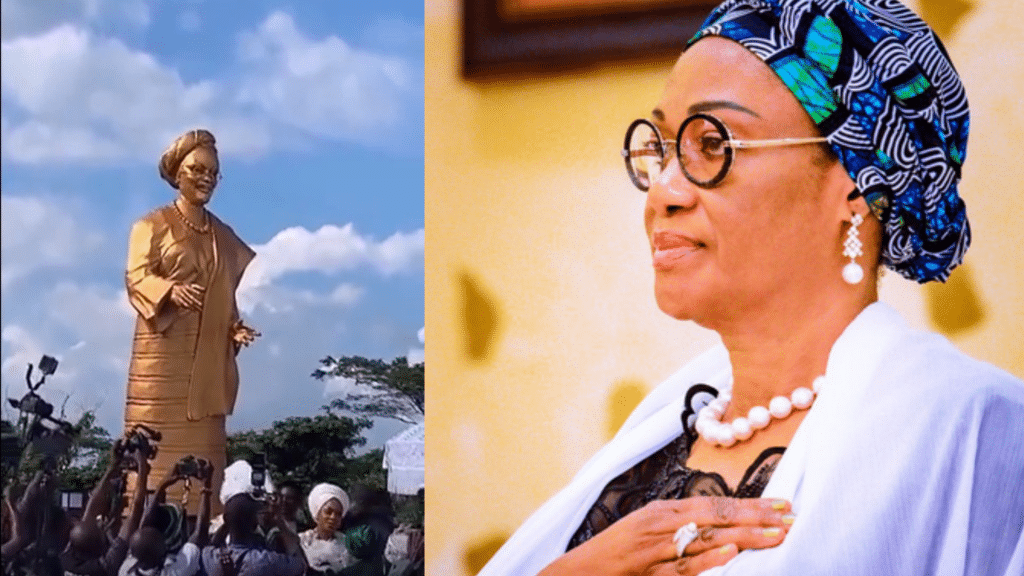The Ooni of Ife, Oba Adeyeye Ogunwusi, unveiled a golden statue of First Lady Oluremi Tinubu at Obafemi Awolowo University (OAU) on October 11, 2024. The event, intended to honor Mrs. Tinubu’s contributions to education and women’s empowerment, has instead raised questions about the appropriateness of such tributes and the role of traditional rulers in modern Nigerian politics.
The sun-drenched campus of OAU in Ile-Ife buzzed with activity as dignitaries gathered for what was meant to be a celebratory occasion. The day’s events included the inauguration of a new hostel and a 2.7-kilometer road, both donated by the Ooni and named after the First Lady. Mrs. Tinubu, herself an OAU alumna of 41 years, marked the occasion by pledging a generous N1 billion donation to her alma mater.
However, it was the unveiling of a golden statue in Mrs. Tinubu’s likeness that captured national attention and sparked widespread controversy.
The Ooni’s Tribute: Admiration or Adulation?
During the ceremony, Oba Adeyeye Ogunwusi praised Mrs. Tinubu’s long-standing commitment to youth development. He specifically highlighted her role in initiating the “One Day Governor” program during her tenure as First Lady of Lagos State.
“I have been a keen admirer of her, especially when she spearheaded the One Day Governor in Lagos,” the Ooni stated. This provided opportunities to young secondary school boys and girls to become Governor in Lagos. It was a milestone and a major inspiration for the younger ones to aspire and prosper.
The Ooni went on to describe the statue as a symbol of “her remarkable leadership, commitment to education, and advocacy for women’s empowerment.
Within hours of the unveiling, social media platforms were ablaze with criticism. Many Nigerians questioned the justification for such a grand gesture, arguing that Mrs. Tinubu’s contributions did not warrant this level of recognition.

Lauretta Egboh, a social commentator, voiced a common sentiment: “What is so iconic about her that you had to do a statue of her? What ground-breaking or sacrificial thing has she done for the country? Even Chimamanda has done more remarkable things.”
Others, like user @Celenteeg, sought clarification: “So, the big question is what is the significance of this statue? What is the extraordinary thing she did? Can somebody enlighten me, please?”
The controversy surrounding the statue has reignited discussions about the role of traditional rulers in contemporary Nigerian society. Some critics view the Ooni’s gesture as an inappropriate entanglement of traditional institutions with partisan politics.
Political analyst Dr. Oluwaseun Adebayo commented on the situation: “This incident raises important questions about the boundaries between traditional leadership and political influence. It’s crucial to maintain a balance that respects our cultural heritage while ensuring the independence of our traditional institutions.
The statue unveiling has also prompted debate about the allocation of resources in a country facing significant economic challenges. User @Everything_quensley remarked, “If you get money, just find way japa. There is no hope at all,” reflecting a sentiment of disillusionment shared by many young Nigerians.
While criticism has been widespread, some defenders of the gesture have emerged. Supporters argue that recognizing women in leadership positions is crucial for inspiring future generations.
However, the majority of public reactions have been negative, with many questioning the timing and appropriateness of such a tribute. User @Bucky Banky summed up this perspective: “What has she done to deserve a golden statue? I hope Yoruba youths know what to do to the so-called ere. Eye services for Ooni, he doesn’t know what to do with the gold money anymore.”
As the controversy continues to unfold, the statue of First Lady Oluremi Tinubu stands as a lightning rod for debates about leadership, recognition, and the allocation of resources in Nigeria. The incident has highlighted the delicate balance traditional rulers must maintain in a modern democracy and raised important questions about how public figures should be honored.
While the Ooni of Ife intended the statue as a tribute to Mrs. Tinubu’s contributions, the public reaction suggests a significant disconnect between the gesture and popular sentiment. As Nigeria continues to grapple with pressing socio-economic issues, this controversy serves as a reminder of the scrutiny public figures face and the importance of aligning tributes with public perception and national priorities.



